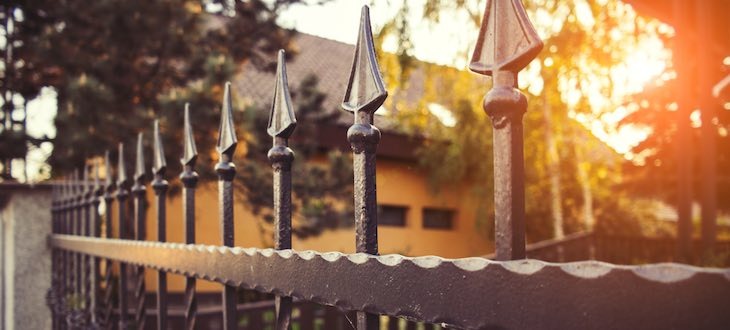Florida’s sunshine is one of the top reasons “Florida’s population keeps soaring as it comes in 2nd in the top States in America in Numeric Growth from 2016-2017. From summer 2016 to summer 2017, data shows that 327,811 people became residents of Florida, amounting to almost 900 people per day moving to the Sunshine State,” reports Miami Luxury Homes.
If you live in Florida, you also know that we have a wide variety of weather that affects humans, buildings, construction, and construction materials:
- Summer heat
- Thunderstorms
- Beach air
- Hurricanes
So, have you ever wondered how Florida weather affects metal especially in the construction industry or for residential and commercial properties? Let’s find out.
How Florida Summer Heat Affects Metal
Simply put heat expands metal. Volume, surface area, and length increase as the temperature increases.
“An increase in the temperature leads to a small increase in the length, area, and volume of a metal, called thermal expansion. The magnitude of the expansion depends upon the specific metal. Thermal expansion results from the increase of atomic vibrations with temperature, and consideration of thermal expansion is important in a variety of applications. For example, when designing pipework in bathrooms, manufacturers need to take into account seasonal changes in the temperature to avoid bursting pipes. Temperature affects metal in numerous ways. A higher temperature increases the electrical resistance of a metal, and a lower temperature reduces it. Heated metal undergoes thermal expansion and increases in volume. Increasing the temperature of a metal can cause it to undergo allotropic phase transformation, which alters the orientation of its constituent atoms and changes its properties. Finally, ferromagnetic metals become less magnetic when they can get hotter and lose their magnetism above the Curie temperature,” explains Sciencing.
How Florida Thunderstorms Affect Metal
Thunderstorms and lightning come together and in Florida they are especially prevalent.
Storm Highway states that there is a “myth about metal and lightning which is wearing jewelry, wearing shoes with metal cleats, or carrying metal objects such as tripods, golf clubs, and umbrellas will attract lightning and make you more susceptible to a strike. The truth is for all purposes, nothing attracts lightning”.
“Lightning – like any electrical charge – seeks the path of least resistance to discharge. In CG lightning, it’s discharging into the earth, but it has to move through an expanse of air to get there. Trees and buildings are better electrical conductors than air. A tall building provides an easier path by shortening the distance that lightning has to travel through air. Accordingly, in the general location where the lightning discharges, it will seek the best conductor that is closest to the cloud. A tall tree is more likely to be hit than the short tree next to it. A tall or large building is more likely to be hit than a small, short one. Roof covering material, or other structural materials of the building, are not determinant factors of where it will strike, the placement and size of the building are,” describes Building Design + Construction.
Building Design + Construction further describes that “a metal roof will not make lightning more likely to strike, but it may make a lightning strike less dangerous if it occurs. That’s right, less dangerous, not more. A metal building may survive a lightning strike with less damage than a similarly sized and located building made of higher-resistance materials. This result is rather counter-intuitive, but it is similar to the fact that during a lightning storm you are safer inside a car – with its metal body – than you are standing next to the car”.
How Florida Beach Air Affects Metal
Most people love the smell of saltwater in the air as they get closer to the ocean or beach. It speaks of relaxation in the sun on the beach.
As far as what the beach air does to metal, Sciencing explains that “the combination of moisture, oxygen, and salt, especially sodium chloride, damages metal worse than rust does. This combination corrodes, or eats away at, the metal, weakening it and causing it to fall apart. Saltwater corrodes metal five times faster than freshwater does and the salty, humid ocean air causes metal to corrode 10 times faster than air with normal humidity. Bacteria in ocean water also consume iron and their excretions turn to rust”.
In coastal areas, the chloride in sea spray, rain and dry salt particles that the wind carries can contribute to the corrosion of stainless steel. Areas within 10 miles of saltwater are generally considered at risk of salt-related corrosion, but that distance varies with location and weather patterns. For more on this subject, read our How Sea Breeze Affects Stainless Steel.
How Florida Hurricanes Affect Metal
Hurricanes and tropical storms in Florida present three hazards for us: rainfall, wind, and storm surge. You have to think of these impacts separately. High winds can damage metal buildings and cause property damage. Storms with weaker winds are more likely to stall and dump heavier rainfall. Rainfall and storm surges can affect metal close to the ground and the moisture, oxygen, and salt damage metal as described above under beach air.
As you can see, Florida weather definitely affects metal.
Visit Tampa Steel & Supply for Quality Metal Products
Are you in need of steel supplies? Look no further than the professionals at Tampa Steel and Supply. We stock an extensive list of steel products for whatever project you need to tackle. We’re proud to have served our customers for nearly four decades and are ready to assist you with your steel needs. Have questions? Give us a call today to learn more, or stop by our beautiful Tampa showroom.
Request a Quote Online
Or Call Tampa Steel & Supply at (813) 241-2801

